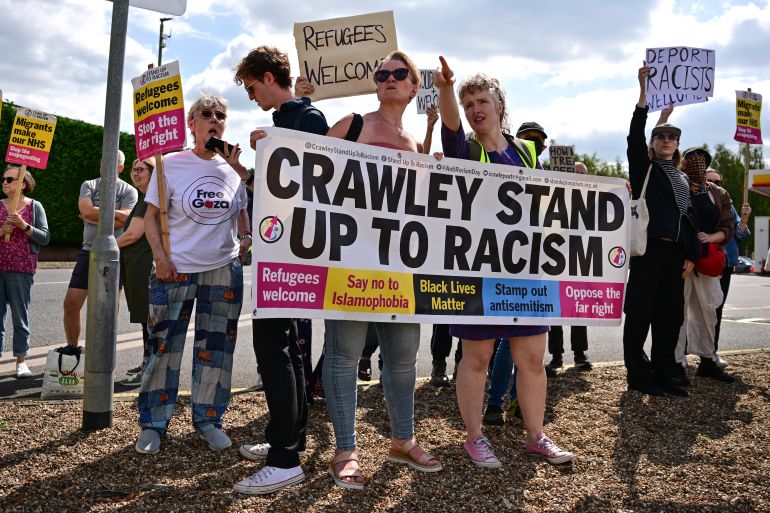Protesters have rallied in cities and towns across the United Kingdom, demanding that Prime Minister Keir Starmer’s government stop housing asylum seekers at hotels.
The rallies on Saturday were met with counter protests by anti-racism campaigners, triggering scuffles between the opposing groups, and police intervention to keep the camps separated.
According to UK media, protests against asylum seeker hotels were held in England, Scotland, Wales and Northern Ireland, including in cities such as Bristol, Liverpool, London, Mold, Perth and County Antrim.
In Bristol, police in riot gear and on horses separated dozens of anti-migrant protesters and several hundred antiracism protesters, according to the BBC and Sky News.
In Liverpool, hundreds turned up for the rival rallies, and some 11 people were arrested for various offences, including being drunk and disorderly, and for assault and affray, The Guardian reported, citing the Merseyside Police.
The nationwide protests came days after the country’s high court granted a temporary injunction blocking a hotel in Epping, Essex, from accommodating asylum seekers.
The ruling followed weeks of protests at the Bell Hotel in Epping, some of which turned violent, after an asylum seeker staying there was charged with sexually assaulting a 14-year-old girl.
The court decision has prompted several councils across the country controlled by Labour, the Conservatives and Reform UK to consider launching legal challenges.
Minister of State for Security Dan Jarvis, however, said on Friday that the government would appeal the high court’s ruling.
“We’ve made a commitment that we will close all of the asylum hotels by the end of this parliament]in 2029], but we need to do that in a managed and ordered way”, Jarvis told broadcasters.
“And that’s why we’ll appeal this decision”.
Starmer’s Labour government has been facing criticism over its immigration policies after official figures showed arrivals of migrants and asylum seekers at a record high, with more people being housed in hotels compared with a year ago.
Home Office data showed last week that more , than 50, 000 migrants and asylum seekers had crossed the English Channel in small boats since Starmer became prime minister last year, a sometimes deadly journey often made in flimsy inflatable dinghies.
And the most recent figures available showed that there were about 32, 345 asylum seekers being housed temporarily at hotels in the UK by the end of March.
Officials also show that a record 111, 084 people had applied for asylum in the UK by the end of June this year.
According to the United Nations High Commissioner for Refugees (UNHCR), the UK government does not give most asylum seekers the right to work in the country, making them reliant on the government or family networks for support, including housing.
Meanwhile, the leader of the far-right Reform UK party, Nigel Farage, outlined on Saturday how he would pursue “mass deportations” to tackle irregular migration. His party, which won five seats at last year’s general election, has topped recent voting intention polls.
Farage told The Times newspaper that under the plans, people would be arrested upon arrival, detained on disused military bases, and returned under bilateral deals to Afghanistan, Eritrea and other countries of origin.
According to Farage, “We can be nice to people, we can be nice to other countries, or we can be very tough to other countries,” “US President Donald Trump has quite successfully demonstrated this point,”
The far-right figurehead also declared that he would outlaw the UK from both the UN Convention on Torture and the Refugee Convention.

Just six nations, including Iran, Afghanistan, Iraq, Albania, Syria, and Eritrea, made up 70% of the total number of people traveling to the UK on small boats between 2018 and 2024, according to The Migration Observatory at the University of Oxford.
According to migration observatory data, 73 people died last year trying to cross the English Channel in small boats, more than in the previous six years combined.
Source: Aljazeera

Leave a Reply